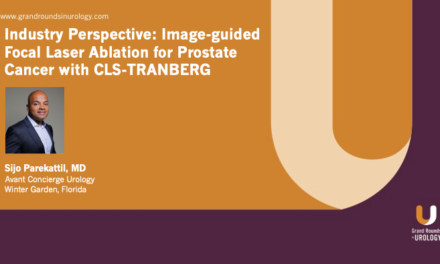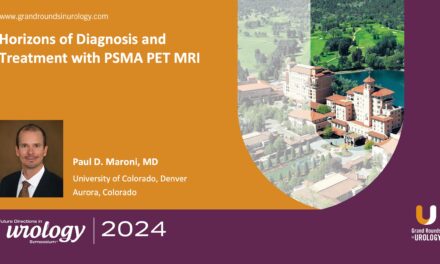Wolfgang Weber, MD, presented “Experience with 18F-rhPSMA7.3 for Prostate Cancer” during the virtual 5th Global Summit on Precision Diagnosis and Treatment of Prostate Cancer in September 2021.
How to cite: Weber, Wolfgang. “Experience with 18F-rhPSMA7.3 for Prostate Cancer.” September 2021. Accessed Nov 2025. https://grandroundsinurology.com/experience-with-18f-rhpsma7-3-for-prostate-cancer/
Doctor Knows Best? Why Prostate Cancer Care Must Be Transformed Into Digital Health – Summary
In this presentation, shown during the 2021 Virtual Global Summit on Precision Diagnosis and Treatment of Prostate Cancer and supported by Blue Earth Diagnostics, Wolfgang Weber, MD, Professor and Chair of the Department of Nuclear Medicine at the Technical University of Munich in Germany (TUM), discusses clinical experience with 18F-rhPSMA7.3. He begins by noting that 18F-rhPSMA7, 18F-rhPSMA7.3, and 177Lu-rhPSMA are investigational products not approved by the U.S. Food and Drug Administration (FDA) and explaining the concept of radiohybrid prostate-specific membrane antigen ligands (rhPSMAs), including definitions and properties. Dr. Weber then discusses 18F-rhPSMA7 biodistribution and 18F-rhPSMA7.3 biodistribution in patients from a phase I clinical trial. He next addresses 18F-rhPSMA7 diagnostic performance in biochemical recurrence, sharing scan images and showing that the detection rate increases with prostate-specific antigen (PSA) level; he points out that data show an almost identical diagnostic performance of 18F-rhPSMA7.3. Dr. Weber goes on to share data on lesion localization in those with biomedical recurrence and explains that 18F-rhPSMA7.3 led to management changes in 73 percent of these patients. He goes on to share 18F-rhPSMA7 diagnostic performance in n-staging of high-risk prostate cancer, showing that it had a sensitivity of 72 percent and a specificity of 93 percent; he also shares promising data from preclinical studies of 177Lu-rhPSMA-7.3 for treatment of prostate cancer. Dr. Weber then summarizes his talk, emphasizing that 18F-rhPSMA7(.3) is a promising tracer for imaging prostate cancer for primary staging and in the case of biochemical recurrence. He explains that limited renal excretion facilitates evaluation of the prostate and the prostate bed before surgery, prospective registration trials have completed accrual, and the use of rhPSMA ligands for therapy of prostate cancer is being evaluated preclinically.
The Virtual Global Summit on Precision Diagnosis and Treatment of Prostate Cancer brings together key international opinion leaders of every clinical subspecialty involved in patient care. This event is an integral part of the AdMeTech Foundation’s Annual Summit, which was established in 2016 and became seminal in shaping the state of the art and future vision for precision care. The goal of this event is three-fold: 1) Educating the key stakeholders; 2) Supporting a sustained cross-disciplinary dialogue and consensus on the best emerging clinical practices and research priorities; and 3) Expediting clinical adoption of promising novel diagnostics and therapeutics. For more educational activities from this virtual event, visit our collection page.
ABOUT THE AUTHOR
Wolfgang Weber, MD, is Professor and Chair of the Department of Nuclear Medicine at the Technical University of Munich in Germany (TUM). Dr. Weber graduated from and trained at TUM. He has been an Associate Professor in the Department of Molecular and Medical Pharmacology at the University of California, Los Angeles; Professor and Chair of the Department of Nuclear Medicine at the University of Freiburg in Freiburg im Breisgau, Germany; Chief of Nuclear Medicine at Memorial Sloan-Kettering Cancer Center in New York City; and Professor of Radiology at Weill-Cornell Medical College, also in New York City. He focuses on molecular imaging of cancer for therapeutic interventions, and is interested in targeted radionuclide therapy and theranostics. Dr. Weber has published 250+ papers in numerous journals, including the Journal of Nuclear Medicine, the European Journal of Nuclear Medicine and Molecular Imaging, the Journal of Clinical Oncology, and others. He has also served on the editorial boards of several medical journals.




